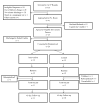Meals Enhancing Nutrition After Discharge: Findings from a Pilot Randomized Controlled Trial
- PMID: 28065635
- PMCID: PMC5368006
- DOI: 10.1016/j.jand.2016.11.005
Meals Enhancing Nutrition After Discharge: Findings from a Pilot Randomized Controlled Trial
Abstract
Background: After older adults experience episodes of poor health or are hospitalized, they may not return to premorbid or prehospitalization eating behaviors. Furthermore, poor nutrition increases hospital readmission risk, but evidence-based interventions addressing these risks are limited.
Objective: This pilot study's objective was to evaluate the feasibility of conducting a randomized controlled trial assessing a post-discharge home-delivered meal program's impact on older adults' nutritional intake and hospital readmissions and to assess patient acceptability and satisfaction with the program. The aims of the study were to evaluate successful recruitment, randomization, and retention of at least 80% of the 24 participants sought; to compare the outcomes of hospital readmission and total daily caloric intake between participants in the intervention and control groups; and to assess patient acceptability and satisfaction with the program.
Design: This study used a two-arm randomized controlled trial design, and baseline data were collected at enrollment; three 24-hour food recalls were collected during the intervention period; and health services utilization and intervention satisfaction was evaluated 45 days post-discharge.
Participants/setting: Twenty-four patients from the University of Alabama at Birmingham Hospital's Acute Care for Elders (ACE) Unit were enrolled from May 2014 to June 2015. They were 65 years or older; at risk for malnutrition; cognitively intact; able to communicate; discharged to a place where the patient or family was responsible for preparing meals; and diagnosed with congestive heart failure, chronic obstructive pulmonary disease, acute myocardial infarction, or pneumonia. Final analysis included 21 participants.
Intervention: The intervention group received 10 days of home-delivered meals and nutrition education; the control group received usual care and nutrition education.
Main outcome measures: The main outcome was intervention feasibility, measured by recruitment and retention goals. Hospital readmissions, caloric intake, and satisfaction with the intervention were also evaluated.
Statistical analyses performed: Univariate and bivariate parametric statistics were used to evaluate differences between groups. Goals for success were identified to assess feasibility of conducting a full-scale study and outcomes were measured against the goals.
Results: Of the randomized participants, 87.5% were retained for final data collection, indicating that this intervention study is feasible. There were no significant differences between groups for hospital readmissions; however, caloric intake during the intervention period was greater for intervention vs control participants (1,595 vs 1,235; P=0.03). Participants were overwhelmingly satisfied (82% to 100% satisfied or very satisfied) with staff performance, meal quality, and delivery processes.
Conclusions: Conducting a randomized controlled trial to assess outcomes of providing home-delivered meals to older adults after hospital discharge in partnership with a small nonprofit organization is feasible and warrants future research.
Keywords: Home- and community-based services; Home-delivered meals; Nutritional risk; Older adult nutrition.
Copyright © 2017 Academy of Nutrition and Dietetics. Published by Elsevier Inc. All rights reserved.
Figures

References
-
- Goodman DC, Fisher ES, Chang C-H. [Accessed September 4, 2015];The Revolving Door: A Report on US Hospital Readmissions. 2013 http://www.rwjf.org/content/dam/farm/reports/reports/2013/rwjf404178.
-
- Rau J. Medicare To Penalize 2,217 Hospitals For Excess Readmissions. [Accessed September 5, 2015];Kaiser Health News. 2012 http://khn.org/news/medicare-hospitals-readmissions-penalties/
-
- [Accessed April 27, 2016];What’s Medicare? 2016 https://www.medicare.gov/sign-up-change-plans/decide-how-to-get-medicare....
-
-
Patient Protection and Affordable Care Act, 42 U.S.C. § 18001 et seq. (2010).
-
-
- [Accessed September 8, 2015];Building a Consensus for Better Patient Outcomes. 2015 http://malnutrition.com/consensuspaper.
Publication types
MeSH terms
Grants and funding
LinkOut - more resources
Full Text Sources
Other Literature Sources
Medical
Miscellaneous

